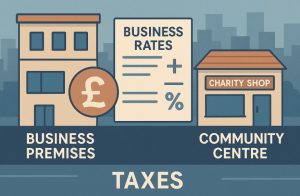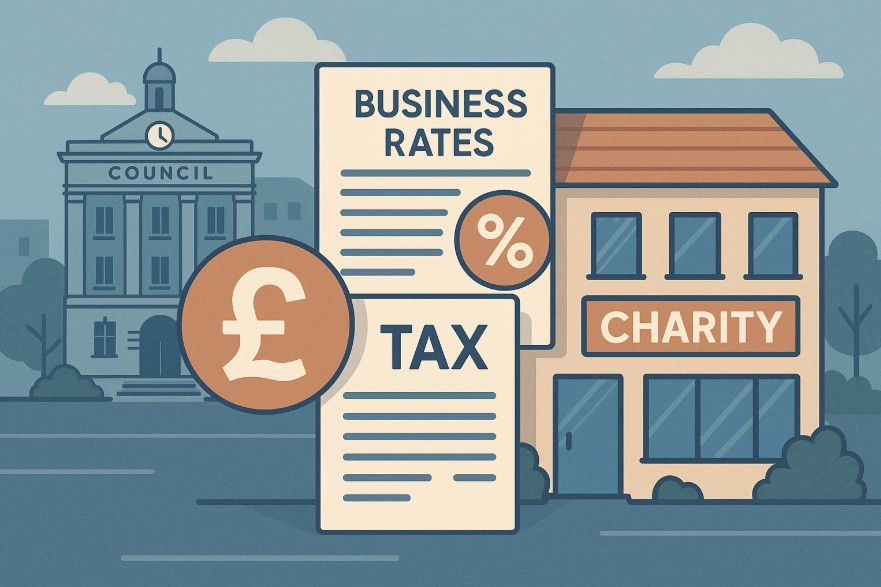Business rates are a significant consideration for charities operating physical premises in the UK. While many assume charities are automatically exempt, the reality is more nuanced. Depending on how a property is used and the organisation’s status, charities may qualify for substantial reliefs or even full exemptions.
Understanding the eligibility criteria, types of relief available, and application processes is crucial for effective financial planning. This guide explores whether charities pay business rates and how they can benefit from available exemptions.
What Are Business Rates and Why Do They Matter to Charities?

Business rates are charged on most non-domestic properties in the UK, including those used by charities. These rates are calculated based on the property’s “rateable value” as assessed by the Valuation Office Agency (VOA).
For charitable organisations, the impact of business rates can be substantial. Many operate on limited budgets and rely on cost-saving mechanisms to allocate funds toward their primary objectives.
The cost of occupying property can significantly affect a charity’s financial health. Without available reliefs, many organisations would struggle to maintain physical spaces such as offices, shops, or community hubs. Business rates therefore form a critical component of any charity’s operational planning.
Are Charities Required to Pay Business Rates in the UK?
Charities in the UK are generally liable for business rates on any non-domestic property they occupy. However, they are entitled to specific reliefs that reduce this liability, provided they meet certain conditions.
These reliefs are not automatic. The charity must actively apply to their local council, presenting evidence that their property is being used wholly or mainly for charitable purposes. If approved, they will receive substantial discounts on their rates bill.
Charities that fail to apply, or whose use of the property is not clearly charitable in nature, may be required to pay the full business rates amount like any other business.
What Is Mandatory Business Rates Relief for Charities?

Mandatory business rates relief allows eligible charities to receive an 80% reduction on their business rates. This relief is designed to support organisations delivering public benefit, and it is widely accessible to registered charities in the UK.
Criteria for Eligibility
- The organisation must be registered with the Charity Commission.
- The property must be used wholly or mainly for charitable objectives.
- The use of the property must be non-commercial in nature or directly linked to the charity’s goals.
Councils evaluate applications based on the property’s purpose, usage patterns, and supporting documentation. While approval is common for compliant charities, misuse or misrepresentation can lead to withdrawal of relief.
Benefits of Mandatory Relief
- Significant cost savings
- More funds available for mission-related activities
- Lower operational overheads, especially in high-rent areas
Can Charities Receive Discretionary Business Rates Relief?
In addition to mandatory relief, local councils have the authority to offer discretionary relief. This additional support helps charities eliminate the remaining 20% of their business rates bill, potentially resulting in full exemption.
Discretionary relief is not guaranteed and varies from one council to another. Local authorities assess:
- The social value delivered by the charity
- Whether the charity supports disadvantaged communities
- The alignment of the charity’s work with council priorities
Charities must often submit detailed statements and financial documents to support their claim.
Common factors influencing discretionary relief decisions:
- Type of services provided (health, education, housing support)
- Number of beneficiaries in the local area
- Financial stability and need for additional support
Do All Charity Properties Qualify for Relief?

Not every property used by a charity automatically qualifies for business rates relief. The nature and purpose of the use must align closely with charitable objectives. Councils will examine whether the premises are used wholly or mainly for qualifying activities.
To help distinguish eligible from ineligible properties, consider the following comparison:
Property Usage and Eligibility
| Property Type | Relief Eligibility | Conditions for Approval |
| Charity Shop | Eligible | Must sell donated goods; profits support charity aims |
| Administrative Office | Eligible | Supports operations central to charitable activities |
| Residential Letting Property | Ineligible | Considered commercial activity unless used for housing vulnerable groups |
| Vacant Building | Generally Ineligible | Must be in use to qualify, unless temporary vacancy is justified |
| Mixed-Use Facility | Partially Eligible | Relief may apply to the portion used for charitable work |
In mixed-use properties, the portion used for non-charitable activities may still be subject to full business rates.
How Do Community Amateur Sports Clubs (CASCs) Benefit?
Community Amateur Sports Clubs are eligible for similar business rates reliefs as charities. Although CASCs are not charities, they are recognised under HMRC’s CASC scheme, which allows them to access an 80% reduction on rates for properties used for sporting purposes.
Eligibility requirements for CASCs:
- Must promote community participation in eligible sports
- Cannot discriminate in membership criteria
- Must reinvest profits into the organisation
Local authorities may provide additional discretionary relief if the CASC engages in community outreach, offers free or subsidised access to sports facilities, or contributes to local wellbeing.
While CASCs benefit similarly to charities, their exemption status can differ based on the type of activities conducted at the premises.
How Can Charities Maximise Their Business Rates Relief?

Maximising business rates relief is essential for charities looking to minimise operational costs and allocate more funds towards their core mission.
Although mandatory relief provides up to 80% off business rates, and discretionary relief may cover the remaining 20%, securing and retaining this support requires strategic planning, accurate documentation, and ongoing engagement with local authorities.
Charities should not assume that relief will be automatically applied or renewed. Instead, they need to proactively manage the application process and ensure their eligibility remains intact.
Understanding the Full Scope of Available Reliefs
One of the most effective ways to maximise relief is by ensuring the charity is aware of all available support mechanisms. Beyond the standard mandatory and discretionary reliefs, there may be localised schemes, temporary exemptions, or additional support for small properties.
For example, some councils offer supplementary discretionary discounts for organisations delivering specific social outcomes like employment support, youth services, or homelessness prevention. Being informed about local schemes can unlock extra savings.
Aligning Property Use With Charitable Objectives
A charity’s eligibility for business rates relief largely depends on whether the property is being used wholly or mainly for charitable purposes. This means the space must directly support the charity’s objectives and not be used for commercial, residential, or administrative purposes unrelated to its mission.
To align property use effectively:
- Convert underused spaces into areas that directly support your charitable activities, such as training rooms or public service areas.
- Avoid subletting or leasing parts of the premises unless the purpose supports the charity’s goals.
- If part of the property is used for income generation (e.g., a café or venue hire), ensure the proceeds are reinvested into the charity and this is clearly documented.
Maintaining Accurate and Current Documentation
Councils require clear and updated records to evaluate business rates relief claims. Poor documentation is one of the main reasons relief is delayed, reduced, or denied.
Charities should ensure they maintain:
- A copy of their charitable status confirmation from the Charity Commission
- A detailed breakdown of property usage, including floorplans and function-specific zones
- Financial statements showing how funds are used, including any commercial activity
- Annual reports that outline how the property supports the charity’s work
When applying for or renewing relief, presenting this information upfront increases transparency and speeds up the approval process.
Proactively Engaging With Local Authorities
Building a relationship with the local council’s business rates team can be highly beneficial. Councils are more likely to provide discretionary relief to charities they recognise as valuable community contributors.
Ways to strengthen this engagement include:
- Scheduling periodic check-ins with council representatives
- Providing impact reports to show the value delivered through your services
- Participating in local consultations or initiatives related to charitable support
Proactive communication also ensures that the charity is informed of any changes in relief schemes or new opportunities for support.
Reviewing Property Portfolio Regularly
Charities that operate multiple sites should conduct regular reviews of their property portfolio. This ensures each site remains compliant and that reliefs are being maximised across all eligible locations.
Key considerations during reviews:
- Are all properties being used efficiently for charitable purposes?
- Has the function of any site changed (e.g., from office space to outreach centre)?
- Are any buildings underused and potentially draining resources without delivering mission impact?
An internal audit every 12–18 months helps to keep property usage aligned with both operational goals and relief eligibility.
Using Professional Advice for Complex Cases
For charities with more complex property arrangements, such as those owning multiple buildings, co-locating with other organisations, or using shared commercial spaces, it may be beneficial to consult with professionals.
Specialist advisors in charity law, taxation, or property valuation can:
- Assess the charity’s eligibility under nuanced local policies
- Help with preparing appeal documents if relief is denied or reduced
- Offer guidance on restructures that could enhance eligibility
- Support the accurate calculation of rateable values and potential savings
Although this comes with a cost, the long-term financial benefits of maximising relief typically outweigh advisory fees, especially for large or growing organisations.
Monitoring Legislative Changes and Policy Reforms
Business rates relief is subject to change. Central government reviews, local authority policy shifts, and broader economic pressures can all influence how relief is awarded or calculated.
Charities should monitor:
- Annual Budget announcements by HM Treasury
- Local council updates and consultations on discretionary reliefs
- Charity Commission guidance on financial compliance
- HMRC’s updates relating to Community Amateur Sports Clubs (CASCs)
Subscribing to relevant newsletters, joining industry networks, and attending local forums can keep charity leaders informed and prepared.
Are There Risks or Penalties for Misclaiming Charity Relief?

Misuse or misrepresentation in business rates applications can lead to severe consequences. Local authorities regularly review relief awards to ensure they are granted appropriately.
Table: Potential Risks of Misclaiming Relief
| Risk Type | Description | Outcome |
| Relief Withdrawal | Charity no longer meets criteria | Full business rates bill issued retroactively |
| Financial Penalty | Misstatement of use or purpose | Fines or repayment of incorrect relief |
| Legal Action | Fraudulent or dishonest claims | Legal proceedings and potential criminal charges |
| Reputational Damage | Negative public perception | Loss of donor and public trust |
To avoid these risks, charities should report any change in property use promptly, and maintain full transparency during audits or reviews.
What Resources Are Available to Help Charities Understand Business Rates?
Charities don’t have to navigate the complexities of business rates alone. Several resources and organisations provide assistance to help them understand and apply for relief effectively.
Key support options include:
- Local authority business rates teams for tailored guidance
- The Charity Commission for compliance support
- HMRC for information on CASCs and tax benefits
- Professional consultants with expertise in charity finance
- Online portals offering tools to calculate potential relief
Some councils even provide downloadable application forms and step-by-step guides to support first-time applicants. Regular engagement with these resources helps ensure the charity remains up to date and fully compliant.
Conclusion
Business rates are a recurring financial commitment that charities cannot afford to overlook. Fortunately, the UK offers significant reliefs for organisations committed to social good. However, these reliefs come with responsibilities — understanding eligibility, maintaining compliance, and keeping abreast of policy changes are all essential.
By proactively managing their business rates strategy, charities can reduce their overheads and redirect funds towards their causes, ultimately delivering greater value to the communities they serve.
FAQs
What is the difference between mandatory and discretionary business rates relief?
Mandatory relief is a statutory entitlement for charities using property for charitable purposes, offering an 80% reduction. Discretionary relief is additional support that may be granted by local councils based on community benefit.
Can a charity receive 100% exemption from business rates?
Yes, if a local authority grants full discretionary relief on top of the mandatory 80%, a charity can effectively receive 100% exemption.
Are unoccupied charity properties eligible for relief?
Generally, unoccupied properties do not qualify for relief unless they are temporarily vacant for legitimate operational reasons, such as refurbishment.
How do local councils assess eligibility for discretionary relief?
They consider factors such as the organisation’s community impact, financial need, alignment with council objectives, and efficient use of property space.
Can a social enterprise or CIC qualify for charity rate relief?
Only if the organisation is registered as a charity. CICs and social enterprises may apply for discretionary relief but are not automatically entitled to mandatory relief.
Do all charity shops qualify for business rates relief?
Most do, but only if they sell predominantly donated goods and all proceeds support the charity’s main objectives.
Is it worth consulting a professional about business rates?
Yes, especially if the charity manages multiple properties or if there is uncertainty around eligibility. Professional advice can prevent errors and help secure maximum relief.








